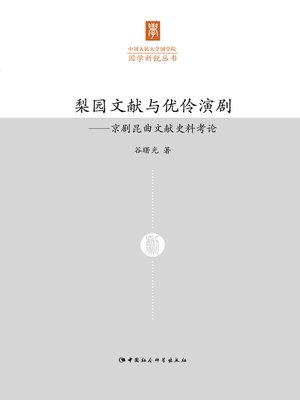梨园文献与优伶演剧 (Pear Garden Literature and Actor Performance)
ebook ∣ 京剧昆曲文献史料考论 (Research on Documentary Sources of Peking Opera and Kunqu Opera )
By 谷曙光

Sign up to save your library
With an OverDrive account, you can save your favorite libraries for at-a-glance information about availability. Find out more about OverDrive accounts.
Find this title in Libby, the library reading app by OverDrive.



Search for a digital library with this title
Title found at these libraries:
| Library Name | Distance |
|---|---|
| Loading... |
京剧昆曲既是中国传统文化的精粹,亦是考察中国社会、文化的一个独特视角。清代以降,戏曲的重心已从案头转移到了舞台、由文本更迭为表演。清乾隆以后的戏曲史,实即一部优伶演剧史。 本书立足于文、音、像、档等"梨园文献",专注其特有的综合性、多元性和鲜活性,以之观照清中叶以来的剧坛变迁和优伶爨演。概言之,文献是基石,梨园是生态,优伶是主体,而演剧是研究的终极目标。发现新材料、关注珍稀史料,乃本书一大特色;议论出于文献,则是研究始终秉持的理念;而优伶与演剧,又是本书的着力点。本书首次标举"梨园文献"的概念,案头与场上贯通,文献与思辨并重,尝试创新研究范式,切实推进清乾嘉以迄民国的戏曲研究。( Peking Opera and Kunqu Opera are the essence of traditional Chinese culture, and a unique perspective on the Chinese society and culture. Since the Qing Dynasty, the focus of opera has been shifted to the stage from the desk, and changed from text to show. The history of the opera after the Qianlong period of the Qing Dynasty is an actor performance history. Based on "text, sound, images, files and other literature of Pear Garden, this book focuses on the unique comprehensiveness, diversity and liveliness of operas, and studies the changes in the opera circles and actor performances since the middle Qing Dynasty. In a word, literature is the cornerstone, Pear Garden is ecology, actor is the main body, and performance is the ultimate goal of the research. Finding new material and paying attention to the rare historical data are a major characteristic of this book; citing discussion from literature is the concept always upheld; and the actor and the performance are the focal point of the book. This book for the first time upholds the concept of "literature of Pear Garden", combing the desk and stage, paying equal importance to literature and philosophy as speculation, trying to innovate research paradigm, and effectively promoting the opera research from the Qianlong and Jiaqing periods of the Qing Dynasty to the period of the Republic of China.)







